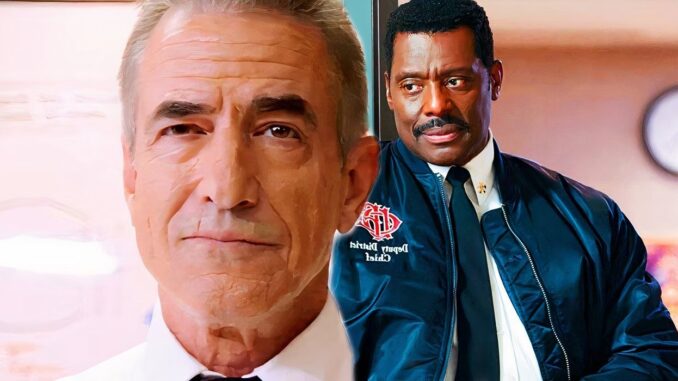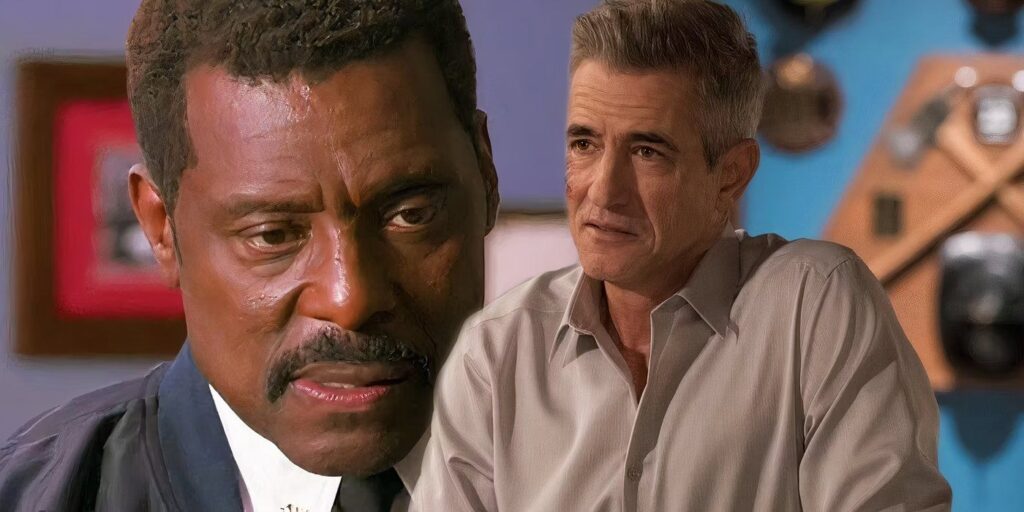
Season 13 of Chicago Fire has been nothing short of intense, with unexpected twists and challenges for the crew of Firehouse 51. The spotlight recently shifted to Joe Cruz (Joe Minoso) in a gripping storyline that not only tested his resolve but also highlighted the capabilities of the new firehouse chief, Dom Pascal. While the departure of Wallace Boden (Eamonn Walker) left big shoes to fill, Pascal’s handling of Cruz’s crisis proved that he is exactly the kind of leader Firehouse 51 needs during this tumultuous time.
Cruz’s Crisis Unfolds
The midseason finale of Chicago Fire left viewers on edge, with Cruz facing an unsettling dilemma involving Junior Polanco. Junior, recently released from prison, confronts Cruz over the death of his cousin, gang leader Flaco, who died in a fire during Season 1. Things escalate when Junior is shot by gang members in the winter premiere, leaving Cruz injured as well. Torn between loyalty and duty, Cruz finds himself grappling with the past while trying to navigate the present.
Enter Chief Dom Pascal, whose leadership and investigative instincts steer the firehouse through this crisis. When Pascal questions Cruz about the events surrounding Flaco’s death and Polanco’s release, Cruz’s hesitance raises red flags. Recognizing that Cruz is withholding information, Pascal involves Kelly Severide (Taylor Kinney) to revisit the case and uncover the truth.
Why Dom Pascal’s Leadership Stands Out
Pascal’s approach to leadership is markedly different from his predecessor, Wallace Boden. While Boden acted as a mentor and father figure, Pascal is methodical, impartial, and unafraid to ask difficult questions. When Cruz struggles to share details about his past with Flaco and Polanco, Pascal is quick to notice his body language and hesitation. His ability to remain detached from personal relationships allows him to evaluate situations objectively, a trait that proves invaluable in resolving complex issues like Cruz’s case.
Pascal’s insistence on transparency creates a culture of accountability within Firehouse 51. Unlike Boden, who often handled matters privately, Pascal sends a clear message: secrets and withheld information won’t be tolerated. This shift in leadership style challenges the crew to adapt, emphasizing professionalism over personal attachments.

Pascal’s fresh perspective is further evident when he questions Severide’s judgment. While Severide defends Cruz, citing the impossibility of saving Flaco during the fire, Pascal challenges whether Severide’s analysis is influenced by sentimentality. This dynamic underscores Pascal’s ability to separate emotion from decision-making, ensuring that all angles are considered before reaching a conclusion.
Why Firehouse 51 Needs Pascal’s Leadership
After 12 seasons under Boden, Firehouse 51 is undergoing a cultural shift. While Boden’s legacy as a compassionate yet firm leader remains unparalleled, Pascal’s arrival marks a new era of accountability and objectivity. His leadership style reflects the growing complexity of the challenges faced by the team, from personal dilemmas to high-stakes rescues.
Pascal’s impartiality is particularly vital for a unit that has long operated as a tight-knit family. While Boden’s approach fostered camaraderie, Pascal’s detachment ensures that everyone is held to the same standard. This balance is crucial for maintaining professionalism while adapting to change.
For Cruz, Pascal’s leadership serves as a wake-up call. The chief’s probing questions and refusal to let matters slide push Cruz to confront his past and take responsibility for his actions. At the same time, Pascal’s ability to handle the situation with tact and firmness demonstrates his suitability as Firehouse 51’s new leader.
A New Chapter for Firehouse 51
Dom Pascal’s arrival at Firehouse 51 signals a turning point for Chicago Fire. As the team adjusts to his no-nonsense leadership style, viewers can expect a fresh dynamic that challenges the status quo. While Pascal may lack Boden’s warmth, his focus on transparency and accountability is exactly what Firehouse 51 needs to navigate the complexities of their work.
Cruz’s recent crisis is just one example of how Pascal’s leadership is shaping the future of the firehouse. By fostering a culture of honesty and professionalism, Pascal is ensuring that Firehouse 51 remains a cohesive and effective unit—even in the face of adversity.